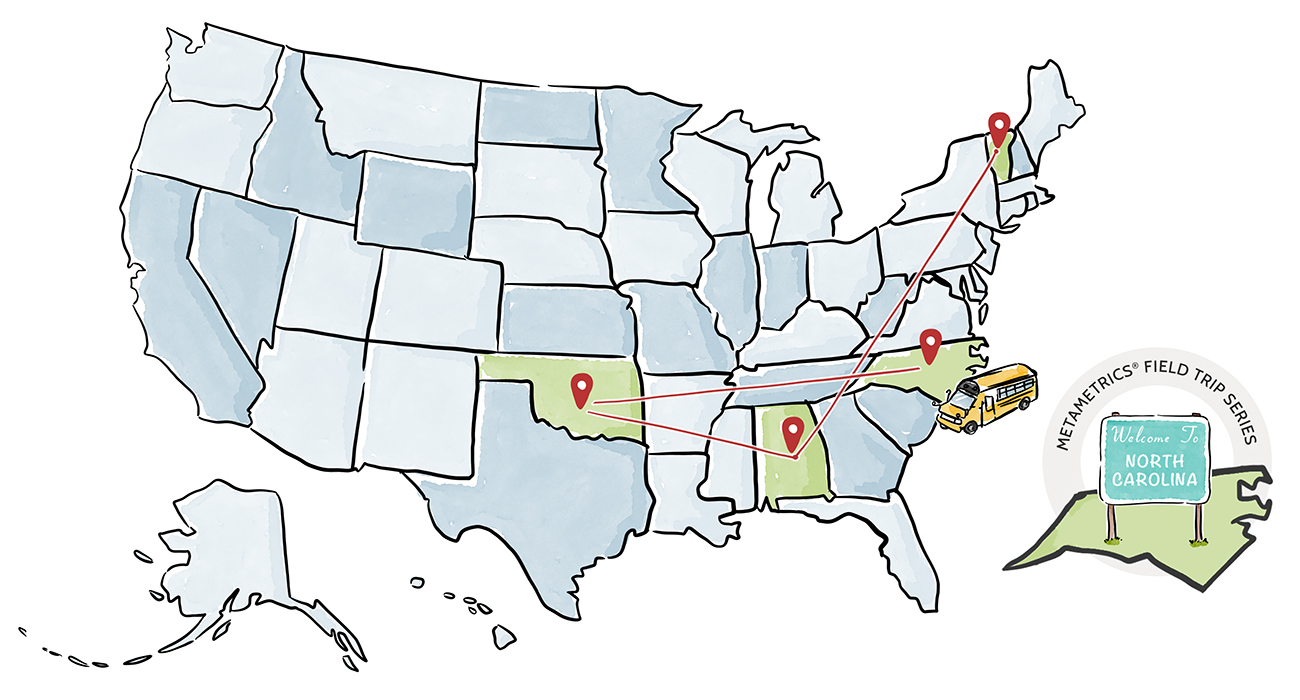For Nearly 30 Years, Lexile® Measures are a “Constant” in North Carolina

MetaMetrics State Partner Showcase: North Carolina Department of Public Instruction
www.dpi.nc.gov | Raleigh, NC

- Number of students: 1,429,275
- Number of teachers: 117,000
- Number of school districts: 115
- Number of schools: 2,700
The first stop on this 2023 state field trip is right in MetaMetrics’ backyard — the North Carolina Department of Public Instruction (NCDPI). The company has been on a long journey with its home state’s education agency — it was its first state partner nearly 30 years ago when the Lexile® Framework for Reading was first launched! In fact, NCDPI collaborated with MetaMetrics on the first-ever customized Lexile map in the late 1990s. North Carolina’s statewide assessment first used Lexile measures in 1996. In the ensuing years, NCDPI has evolved with MetaMetrics, adding reporting the Quantile® Framework for Mathematics to its state assessments in 2009.
As a national leader in promoting literacy growth for students, North Carolina launched its Read to Achieve initiative in 2012 with the goal of ensuring that “every student read at or above grade level by the end of third grade and continue to progress in reading proficiency so that he or she can read, comprehend, integrate, and apply complex texts needed for secondary education and career success.”
Tammy Howard, the state’s senior director of accountability and testing, said the legislation behind Read to Achieve required that all classroom reading assessments used by schools were “reliable and valid.” As they evaluated the tests already in use, Howard and her team recognized that reporting Lexile measures provided them with a common scale across different assessments used and provided a way to evaluate reliability and validity as well as to connect results to the state assessment.
NCDPI’s Office of Early Learning is responsible for implementing the Read to Achieve legislation, which includes a statewide diagnostic assessment. Amy Rhyne, director of the early learning office, said the legislation required that the chosen assessment must report Lexile measures.
Also, as they implemented Read to Achieve, NCDPI needed to determine what proficiency was for a third grader and turned to Lexile measures for that benchmark. Tom Tomberlin, NCDPI’s senior director of educator preparation, licensure and performance, manages the state’s growth model to measure teacher effectiveness and worked with MetaMetrics on a study to determine what proficiency looked like for North Carolina’s third through eighth graders.
Like any long-term initiative, Read to Achieve has evolved. Rhyne said, “As the nation shifts from balanced literacy to science of reading, one of the things the original legislation did was focus primarily on assessments, and pathways and alternative pathways for students to be deemed proficient. Now our focus is on the science of reading and professional development for teachers, educators and administrators.”
 As teachers statewide strive to meet North Carolina’s achievement goals, an important tool for helping them use MetaMetrics’ measures is the Lexile® & Quantile® Hub. Launched in 2019, the Hub is a one-stop shop, provided free of charge to all educators in MetaMetrics’ partner states, where they can find instructional and planning resources, including a career database, book search, text analyzer, academic word lists, a math skills database and more.
As teachers statewide strive to meet North Carolina’s achievement goals, an important tool for helping them use MetaMetrics’ measures is the Lexile® & Quantile® Hub. Launched in 2019, the Hub is a one-stop shop, provided free of charge to all educators in MetaMetrics’ partner states, where they can find instructional and planning resources, including a career database, book search, text analyzer, academic word lists, a math skills database and more.
Kristen Maxey-Moore, section chief of test development for NCDPI, said North Carolina has done annual workshops for teachers on the Hub so that they are aware of the wealth of free resources available. They record the workshops and make them available to teachers throughout the year on the NCDPI website. She said teachers see the Lexile® Find a Book tool, where they can search for books for their students by Lexile measure, grade and interests, as particularly helpful for supporting independent reading for their students.
NCDPI also shares information about Lexile and Quantile® measures on the parent page of the agency’s website and on its individual student reports with links to all the available resources.
—Kristen Maxey-Moore, Section Chief of Test Development for NCDPI
Howard agreed, “Lexiles may be a constant in North Carolina, but they’re far from obsolete. They continue to be a valuable tool for educators across the state to measure student growth.”
NCDPI has had a strong partnership with MetaMetrics, Howard said.
—Tammy Howard, Senior Director of Accountability and Testing for NCDPI
Interested in learning more about how the Lexile and Quantile Frameworks support North Carolina students?
Visit the NCDPI webpage for information.
